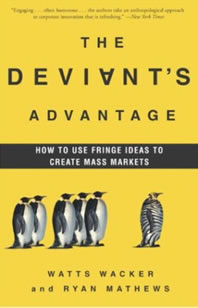 The Deviant's Advantage:
The Deviant's Advantage:
How Fringe Ideas Create Mass Markets
Ryan Mathews and Watts Wacker
Don’t consider yourself deviant? Well, that just may be a career breaker. Odds are the idea or product that will transform your business or industry tomorrow is out there right now, hiding in the shadows of the Fringe, raw, messy, untamed, and just waiting to be exploited. Trapping, taming, and marketing it is the key to burying your competition and staying ahead of your market.
Deviance is nothing more than a marked separation from the norm and is the source of innovation, the kind of breakthrough thinking that creates new markets and tumbles traditional ones. Positive deviation is an inexhaustible font of new ideas, products, and services. It’s the source of all creative thinking and dynamic new market development and ultimately the basis of all incremental profit.
The Deviant’s Advantage describes how deviance proceeds along a traceable trajectory from the Fringe, where it originates but has zero commercial potential; to the Edge, where word of mouth creates a limited audience; to the Realm of the Cool, where the buzz and market momentum really start to build; to the Next Big Thing, where demand is honed and intensifies; finally landing at Social Convention, the heart of the mass market.
Ryan Mathews and Watts Wacker, two of America’s most respected futurists, trace the “Path of the Devox” (the voice, spirit, or incarnation of deviant ideas, products, and individuals), using it as a way to explain how and why:
* Christian fundamentalism morphed from college Bible studies to Republican party king-making
* Reebok cares more about what’s on the feet of kids in Detroit and Philadelphia than what the so-hip-it-hurts set is wearing in New York or on Rodeo Drive
* Napster exploded from an idea germinating inside a sixteen-year-old to a movement with 60 million subscribers that very nearly destroyed the music industry
* Hugh Hefner went from America’s most public pornographer to a cultural icon with decidedly Puritan sensibilities
Mathews and Wacker also look at what happens to formerly deviant products and ideas after they are replaced by the next wave from the Fringe—how they morph into Cliché (where their commercial potential may actually increase), become Icons or even Archetypes, or fade into Oblivion, and how you can profitably manage even a fading concept.
Looking for the next big idea for your business? Then it’s past time to quit staring at the Social Convention for inspiration and start scouring the Fringes of society. Tomorrow’s breakthrough concept is lurking out there right now, in the mind of a deviant individual. Your choice is simple: find it and exploit it, or be buried by those who do.
This book is available in hardback in english and german, and also as an audio download. A paperback edition will be available in March 2004.